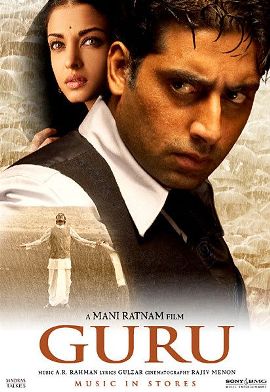Guru–the most important free market movie ever made?
Guru, a 2007 movie from India starring Abhishek Bachchan and Aishwarya Rai and directed by Mani Ratnam, is one of the most pro-free market movies ever made and perhaps the best.
Guru follows Gurukant “Guru” Desai from his small village in India to Turkey where in a series of evocative scenes he shows a natural affinity for the rhythms of markets. Determined to work for himself, Guru returns to India and tries to enter the cotton market but he needs a license and the license system is monopolized by a rich clique with close ties to the government. Guru has no entry into this clique, which  differs in class and caste from his village roots, but his cause is taken up by a liberal newspaper editor, Manik Dasgupta, a veteran of the independence movement, who shames the government into opening up the license system. Guru and Manik become close and Guru becomes godfather to Manik’s daughter who has epilepsy.
differs in class and caste from his village roots, but his cause is taken up by a liberal newspaper editor, Manik Dasgupta, a veteran of the independence movement, who shames the government into opening up the license system. Guru and Manik become close and Guru becomes godfather to Manik’s daughter who has epilepsy.
The movie’s portrayal of entrepreneurship and the problems that Guru must surmount–financial, familial, and political–is unusually smart and sympathetic.
As Guru rises to the top the movie becomes more complex. Guru bribes politicians and skirts rules and regulations. His previous benefactor, the newspaper editor, turns against him. Derek Elley at Variety says Guru “forgets his ethics on the way to the top.” That’s a common but incorrect reading. What is going on is more subtle. Ratnam is telling us that Guru’s virtues are incompatible with a corrupt system and a choice must be made. Consider that on his way to the top, Guru has promised to always honor, love and respect his elder patron and even as they are at odds, he never wavers in this promise. Nor does he waver in his love for Manik’s epileptic daughter, even as she marries the reporter who has led the charges against Guru. Rather than having been corrupted, Guru demonstrates an iron-willed commitment to virtue. Riches and success did not corrupt Guru’s personal virtue nor has his public virtue been corrupted. In contrast to the earlier corruption of the ruling clique we never see Guru preventing others from competing with him. He bribes only in order to build.
The movie is powerful not because it opposes virtue and corruption but because it opposes two ideas of virtue. Is it virtuous to follow the law when the law itself is corrupt? Other artists have explored this question when the lawbreaker opposes social injustice, ala Gandhi and Martin Luther King, but what about when the lawbreaker opposes economic injustice? The question the movie asks is a classic question from Ayn Rand, how can an honest (business)-man live in a corrupt world? The theme becomes clear in the climax, a trial in which Guru, ala Howard Roark, puts society on trial.
The director, Mani Ratnam, has great ambitions. In telling the story of India’s liberation, not from colonialism but from socialism, he aims to elevate a new type of hero for post-socialist India, a business guru. In the trial, Ratnam is also arguing that a house divided against itself, a house half slave and half free, cannot long remain standing. Either India must push forward with a new vision for itself based on business, free and open markets and liberal views (on gender, the disabled, religion and other issues) or it will indeed fall back into internal strife and corruption.
I love the theme of Guru but the movie wouldn’t work without a great performance from Abhishek Bachchan. The beautiful Aishwarya Rai, a Miss World champion, gives a very good performance (she married Bachchan as the movie premiered) as do a host of other actors.
I find it encouraging for India that the movie was a hit and has a 90% rating on RT. You can buy the movie at Amazon or watch it on Youtube.
Addendum: Guru is loosely based on the life of Dhirubhai Ambani who from humble beginnings built Reliance Industries into one of the largest and most profitable firms in the world.